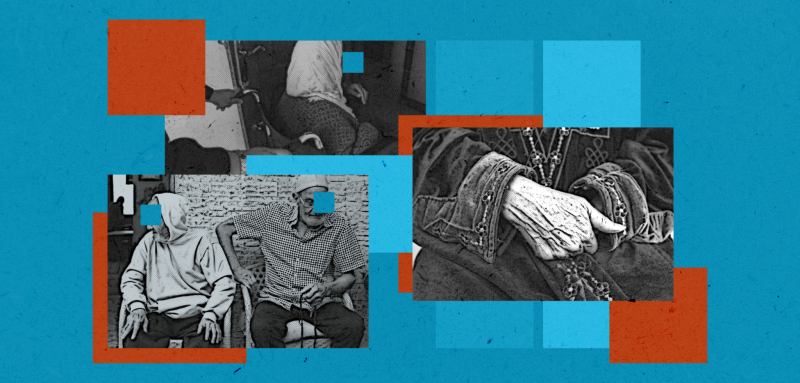The same scene repeats itself daily; they sit in the rooms and the common areas of the senior care home in silence. Each one of them has already narrated the same stories and voiced their grievances since arriving at this small community.
The silence is occasionally interrupted by the voice of one of the supervisors or workers, announcing that the next meal is ready.
This is the reality in several elderly care homes in Cairo that Raseef22 visited to find out about the conditions and well-being of the elderly residents there, whether they chose to be there voluntarily or out of necessity.
Traditionally, residence in senior care homes in the Arab world, especially in Egypt, is often seen as a source of shame and a scandal for families who fail to care for their elderly relatives or those whose health conditions make them unable to take care of themselves on their own. However, what truly weighs on the minds of the residents, even those who willingly sought refuge in these homes, is anticipating visits that seldom take place, leaving them feeling isolated from the world around them as they willingly or reluctantly seclude themselves.
Among the residents of the nursing homes that Raseef22 visited, cases of children and grandchildren completely disappearing after they place their parents in senior care homes are unfortunately all too common.
Among the residents of the nursing homes that Raseef22 visited, cases of children and grandchildren completely disappearing after they place their parents in senior care homes are unfortunately all too common. In one of these homes, situated in the Bulaq Al Dakrour area of Giza Governorate, resides Ms. Sanaa Ahmed, who has been eagerly awaiting a visit from her son or daughter, neither of whom she has seen since they left her at the home two years ago.
Perhaps her children's absence is beyond their control. As Sanaa recounts to Raseef22, her eldest son is currently imprisoned due to a legal matter he was involved in, while her daughter is wanted by the Egyptian police in an unrelated case, "My daughter told me that she's facing problems and can't take care of me. She's constantly evading the police. She left me on the street and asked people to take me to the nursing home."
However, even two years later, her daughter has not called the senior care home to ask about her mother or visit her there.
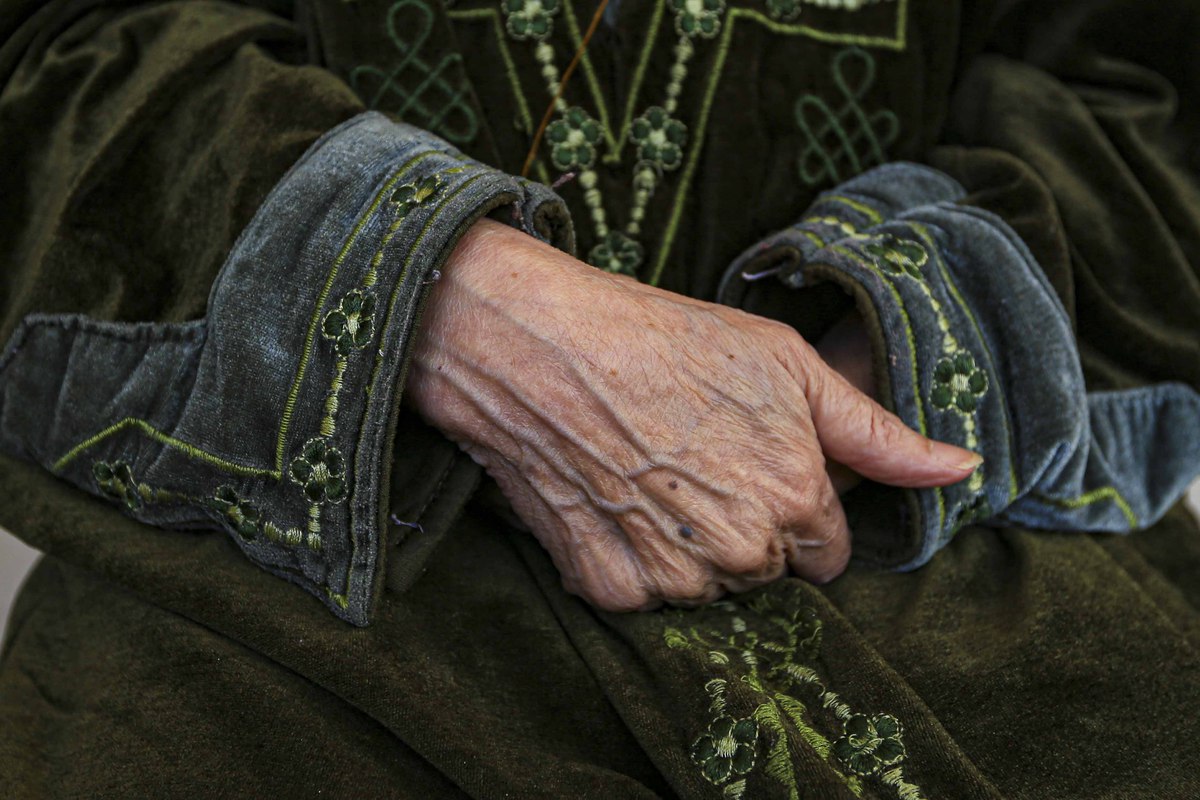 An elderly resident in a nursing home in Egypt
An elderly resident in a nursing home in Egypt
An elderly resident in a nursing home — Photo by Mahmoud al-Khawas
Sanaa often talks to herself, imploring her son and daughter while admonishing them for her current plight. Tearfully, during her interview with Raseef22, she implores, "Is this how you treat me, my daughter? I've gotten old, and you now even have children. I need you now and I long for your visit, even if it's just for a little while."
Fawziya al-Adl, another elderly resident at the care home, has been living with cerebral palsy since childhood. She married a man over 20 years her senior and had a daughter. Fawziya asked her husband to write down her own share of the inheritance to her daughter after his passing, especially the house, to prevent her from facing homelessness during the division of his property with her uncles. She sadly reveals, "I never imagined she would do this to me."
"When my daughter got married, she and her husband threw me out of my house. I was left on the streets, sleeping with cats and dogs. My daughter never made any effort to find me. All I wish for is to see her, embrace her, and tell her how much I miss her"
Fawziya recounts, "When my daughter got married, I was living with her, but her husband refused and they threw me out of the house. I found myself seeking refuge on the streets, sleeping with dogs and cats. Eventually, people took me to the senior care home, and my daughter never made any effort to find me. All I wish for is to see her, embrace her, and tell her how much I miss her."
The circumstances of life took their toll on Fatima Abdel Sattar. Once leading a life of luxury, moving freely, driving her car, and traveling without constraints, she now resides among the elderly blind women at a care home in Nasr City. These are women who have lost their eyesight and whose children are no longer able to care for them.
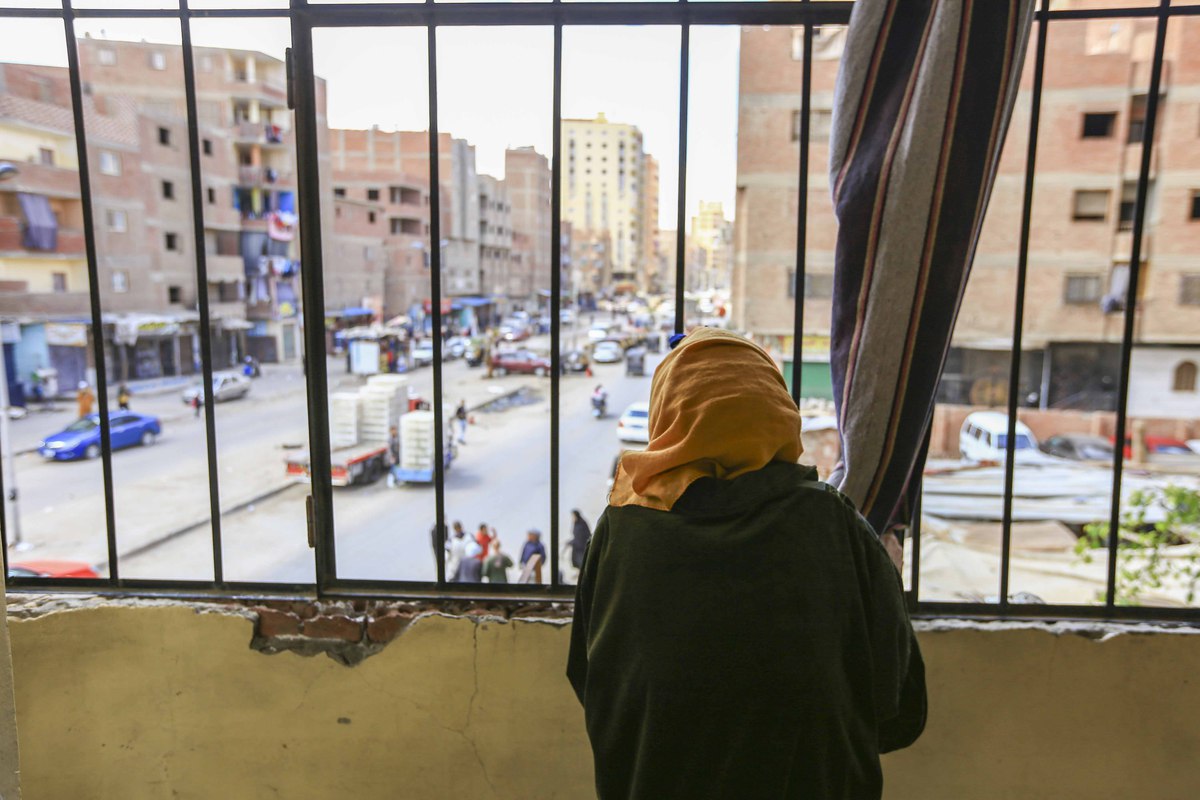 An elderly resident in a nursing home in Egypt
An elderly resident in a nursing home in Egypt
An elderly resident in a nursing home — Photo by Mahmoud al-Khawas
Fatima selflessly relinquished ownership of two apartments she owned to her two sons, content with only her monthly pension. As a former engineer in a high-ranking position, she recounts, "My eldest son faced financial difficulties; he fell ill and had to sell our household belongings. I couldn't stay with him. My younger son married a Lebanese woman who never liked me or wanted to care for me. She used to even attempt to contaminate my medicine so I'd die."
Her husband died early, and she was left visually impaired, which eventually led to complete blindness. Her son's wife refused to let Fatima live with them, "I left them and rented an apartment with my own pension, but things became much more difficult after I lost my sight." A friend suggested she move to the care home for blind elderly women since living alone had become nearly impossible. "As soon as my sons got married, they turned to their wives for affection, and I received little care from them. My eldest son never asks about me, and the younger one does so sporadically. This life's path led me to become a resident at the care home."
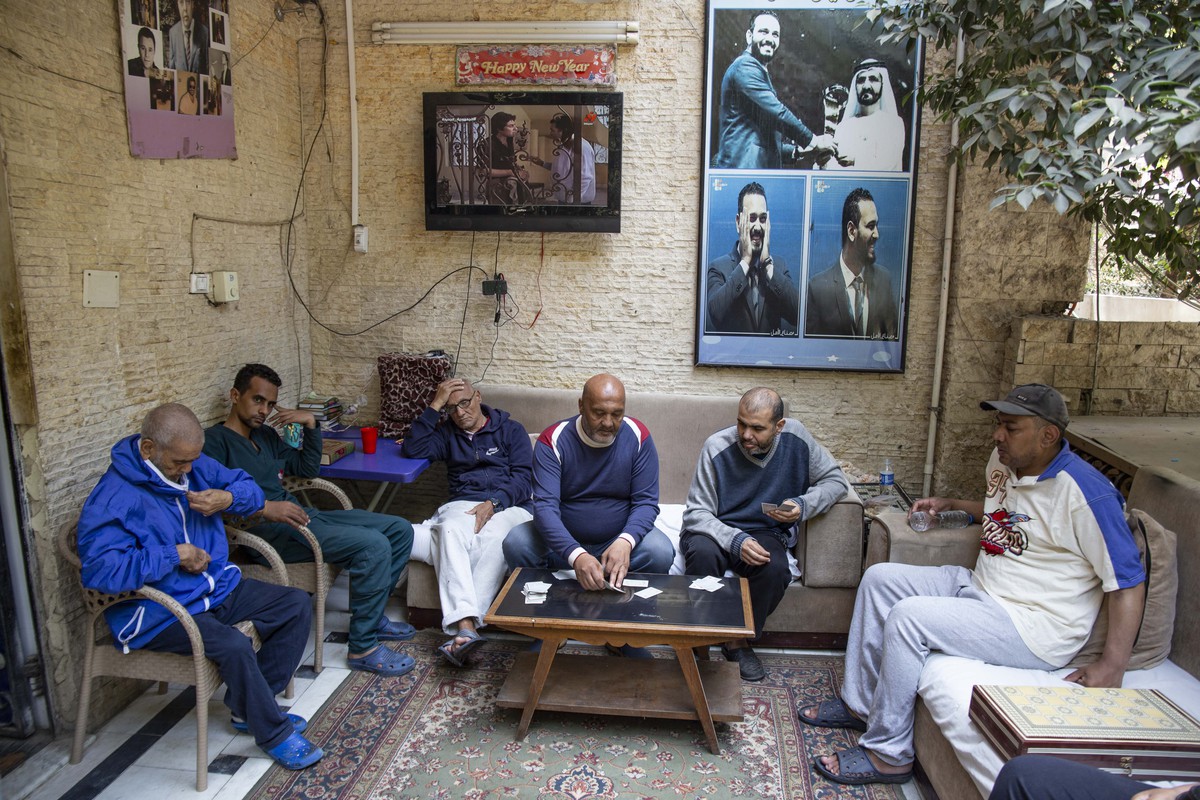 Elderly residents in a nursing home — Photo by Mahmoud al-Khawas
Elderly residents in a nursing home — Photo by Mahmoud al-Khawas
Elderly residents in a nursing home — Photo by Mahmoud al-Khawas
A dispute between a man and his three sons led to them throwing him out into the street after seizing all his wealth, "I once had millions of pounds and lived a life of luxury. I even owned a building that I put under their names, but my own sons cast me out"
The stories of male residents in Egypt's elderly care homes are no less heart-wrenching than those of the women. In a care home located in the Dokki neighborhood in Cairo, we find Samir Mohamed, a former sea captain who once enjoyed a life of affluence. However, a quarrel with his three sons led to them throwing him out onto the streets after seizing all his wealth. With a heavy heart, he laments, "I used to own millions of pounds and lived a life of luxury. I even owned a building that I put under their names, but my own sons cast me out and never looked back, and my own sister encouraged them."
For half a year, the once proud sea captain had to live beneath the October Bridge in Cairo until a shelter, run by an organization that caters to the homeless, came to his rescue. He has been living in this shelter for the past three years, "I left my children in the best condition, but I never want to see them again. The sight of them would kill me. I endured a dark period, living in a pitiful state."
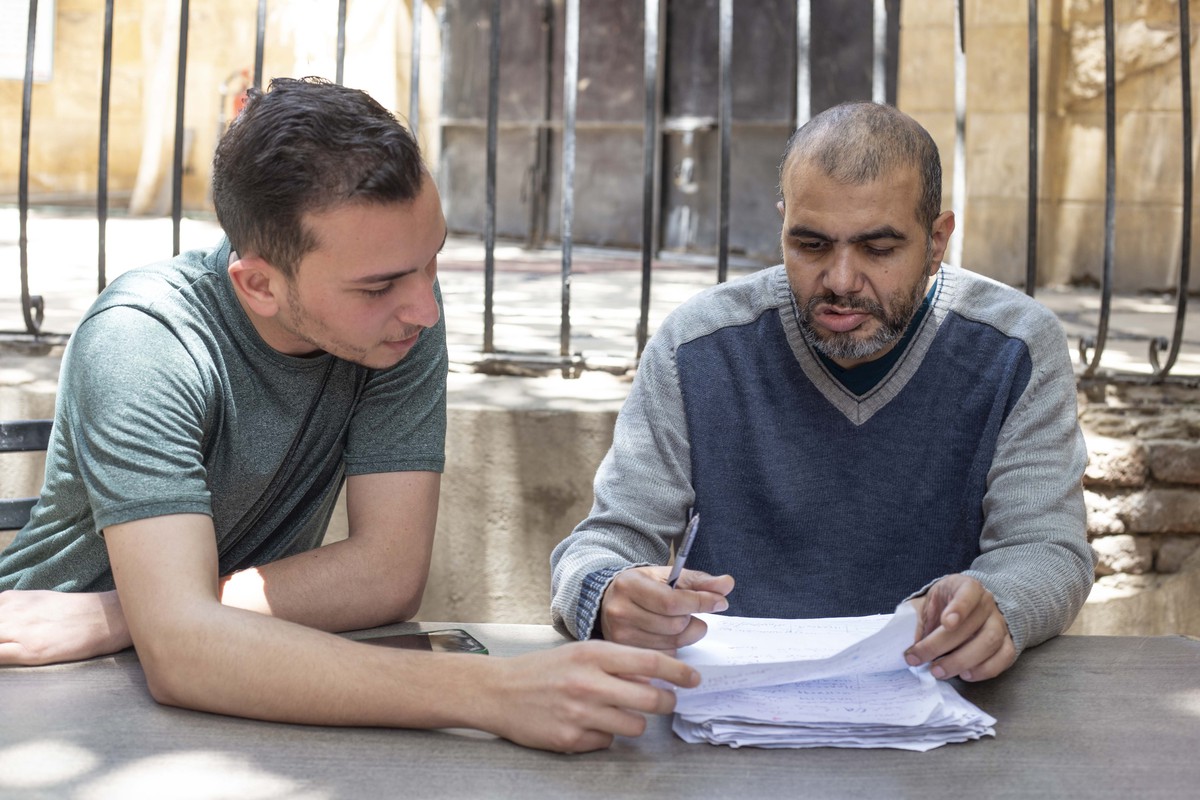 Raseef22 reporter with a patient in a nursing home In Egypt — Photo by Mahmoud al-Khawas
Raseef22 reporter with a patient in a nursing home In Egypt — Photo by Mahmoud al-Khawas
Raseef22 reporter with a patient in a nursing home — Photo by Mahmoud al-Khawas
Despite his family being aware of his fragile mental state, "they callously abandoned me and left me to the harsh streets without a second thought, and no one asked about me. I was no longer wanted in the family. I lost my mother, who was everything I had, and I eventually found myself seeking refuge in the care home."
Speaking to Raseef22, Samia Abdel Hafeez, a supervisor at one of the elderly care homes in Giza, sheds light on the organization affiliated with the home and its efforts to provide psychological support for all residents through social and psychological sessions conducted by a trained social worker. She states, "Our aim is to understand the nature of their problems, the circumstances that led them to the streets, the hardships they faced, and any information like phone numbers and addresses that might help us locate and connect them with relatives."
According to Abdel Hafeez, the care homes first make efforts to establish communication with the families in order to mend relationships and reunite them. "If these attempts fail, the admitted person becomes a full time resident and is offered competent psychological, social, and healthcare support," she states, adding that all elderly care homes rely on donations, "People donate money, and sometimes they provide food supplies, bedding, mattresses, specific tools, and medications. In some cases, they also assist in bathing the residents who are unable to do it themselves."
Dr. Walid Hindi, a mental health consultant, emphasizes that elderly care homes provide effective psychological care to the residents, especially since many of them suffer from psychological issues due to neglect from their children or other issues and traumas. As a result, special care must be provided for them, including personal hygiene, assistance with movement, actively listening to their concerns, and offering entertainment. Additionally, organizing various recreational trips significantly improves the mental well-being of the elderly.
In his conversation with Raseef22, he advises, "We must consistently visit the elderly care homes, and sit and dine with them, and be attentive to their feelings and listen to their concerns."
According to data announced by the Ministry of Social Solidarity in 2018, Egypt has 168 licensed elderly care homes, accommodating 4,530 elderly individuals, with 30% dedicated to women and the same percentage for men, while 40% are shared homes. These homes are spread across 22 governorates, while five governorates lack any elderly care homes, such as North and South Sinai and Matrouh, due to cultural norms and principles. In these areas, it is impossible for any elderly person to live in a care home, as stated by Mahmoud Shaaban, the General Manager of the Elderly Care Department at the Ministry of Social Solidarity.
Shaaban tells Raseef22, "The Ministry provides financial support to every elderly care home in need, as well as programs and activities for the residents inside the homes. They also offer other services like medical convoys and various activities. Moreover, there are 190 clubs across Egypt dedicated to the elderly, with an annual subscription fee of 50 Egyptian pounds."
Shaaban tells Raseef22, "The Ministry provides financial support to every elderly care home in need, as well as programs and activities for the residents inside the homes. They also offer other services like medical convoys and various activities. Moreover, there are 190 clubs across Egypt dedicated to the elderly, with an annual subscription fee of 50 Egyptian pounds."
– Photography by Mahmoud El-Khawas
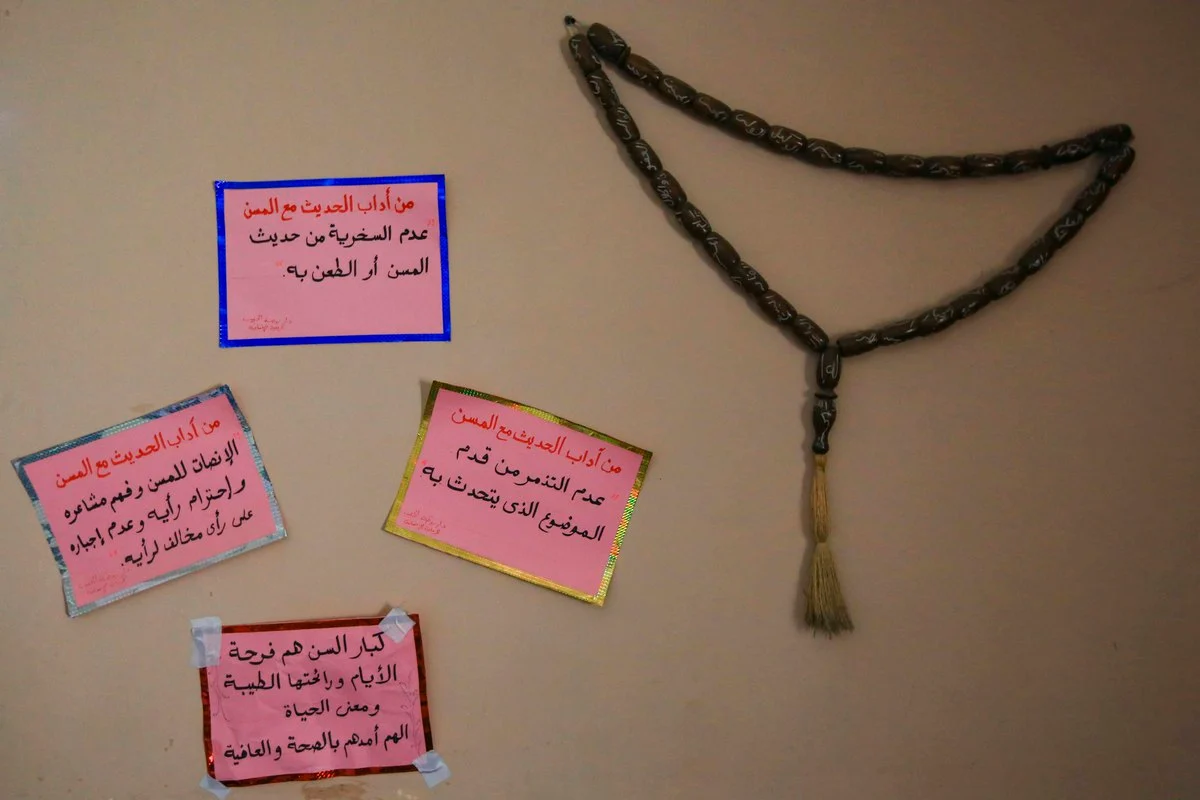 Instructions for workers and visitors on how to deal and interact with the residents in one of Egypt's elderly care homes
Instructions for workers and visitors on how to deal and interact with the residents in one of Egypt's elderly care homes
Instructions for workers and visitors on how to deal and interact with the residents in one of Egypt's elderly care homes — Photo by Mahmoud al-Khawas
Raseef22 is a not for profit entity. Our focus is on quality journalism. Every contribution to the NasRaseef membership goes directly towards journalism production. We stand independent, not accepting corporate sponsorships, sponsored content or political funding.
Support our mission to keep Raseef22 available to all readers by clicking here!
Interested in writing with us? Check our pitch process here!
